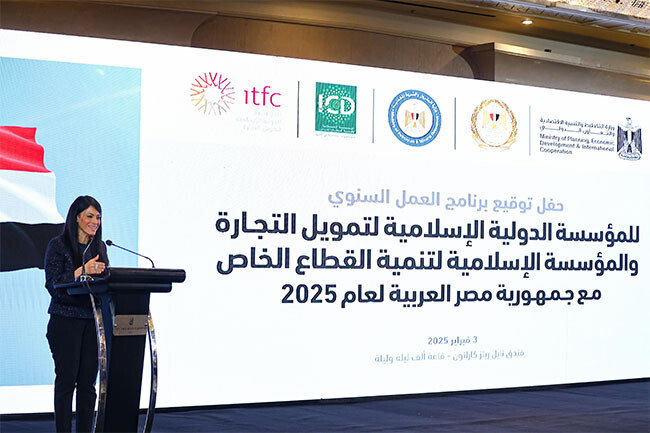
Cairo, Egypt – Egypt has solidified its partnership with the Islamic Development Bank (IsDB) Group, securing $1.7 billion in financing agreements, the Ministry of Planning, Economic Development, and International Cooperation announced on Tuesday. The agreements, encompassing funding for essential commodities, petroleum products, and support for small and medium-sized enterprises (SMEs), were signed in conjunction with the annual work programs for the Islamic Trade Finance Corporation (ITFC) and the Islamic Corporation for the Development of the Private Sector (ICD) in Egypt for 2025.
The substantial funding package aims to bolster Egypt's economic resilience and promote private sector growth. The signing ceremony saw the presence of key government officials, including Kamel Al-Wazir, Deputy Prime Minister for Industrial Development and Minister of Industry and Transport; Sherif Farouk, Minister of Supply and Internal Trade; and Rania Al-Mashat, Minister of Planning, Economic Development and International Cooperation.
A significant portion of the financing, $1.6 billion, comes from the ITFC. Of this, $800 million is earmarked for the Egyptian General Petroleum Corporation (EGPC) to secure vital oil supplies and enhance the availability of petroleum products in the Egyptian market. The remaining $700 million will go to the Egyptian Supply Commodities Authority, bolstering the country's food security by facilitating the import of essential and strategic commodities.
Furthermore, the ICD's annual work program for 2025 allocates $100 million to financial institutions to support SMEs and fund large private sector companies operating in strategic sectors crucial for economic development. This initiative aims to stimulate growth in key areas, particularly the industrial and agricultural sectors, aligning with the state's structural reform plan. The ICD program also includes provisions for direct investments, consulting services in the Islamic sukuk sector for both government and private entities, and capacity building initiatives.
Minister Al-Mashat, also acting as Egypt's Governor at the IsDB, emphasized the strategic importance of these agreements, highlighting the fruitful and long-standing developmental partnership between Egypt and the IsDB Group. She lauded the ITFC's role in supporting foreign trade, particularly the export sector, through programs like the "Arab-Africa Trade Bridges" and the "Women in Global Trade – Phase Two" (She Trades 2) project. Al-Mashat also noted the ICD's contribution to diversifying funding sources through sukuk consulting services and its commitment to supporting SMEs.
Minister Al-Wazir acknowledged the ITFC and ICD's vital role in supporting member countries of the Organization of Islamic Cooperation through innovative financial solutions and developmental projects. He stressed their positive impact on economic growth, job creation, and private sector development, especially for SMEs.
Minister Farouk highlighted the significance of the ITFC's $700 million allocation to the General Authority for Supply Commodities in achieving food security and meeting the needs of Egyptian citizens. He emphasized that this cooperation is crucial for securing strategic commodities and stabilizing the market.
Hani Sonbol, Acting CEO of the ICD, affirmed the ITFC's commitment to expanding cooperation in 2025 with new programs empowering women, youth, SMEs, and exporters. He also reiterated the ICD's dedication to supporting Egypt's developmental plans by providing financing for the Egyptian private sector and banks to bolster SMEs. The agreements were signed by Sonbol, Hossam Ahmed Al-Jarahi, Vice Chairman of the General Authority for Supply Commodities, and Amal Tantawy, Deputy CEO for Financial and Economic Affairs at the EGPC.
[Copyright (c) Global Economic Times. All Rights Reserved.]




























